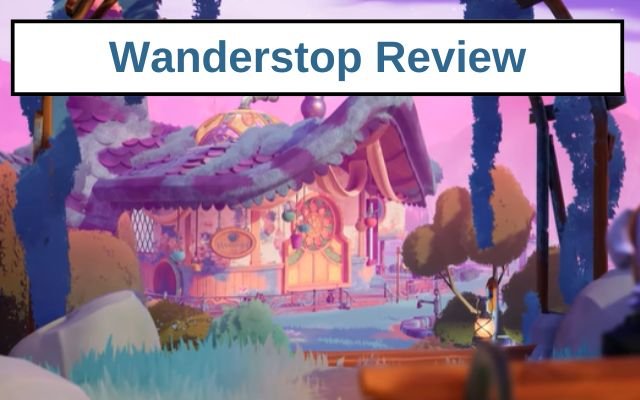Wanderstop: A Comprehensive Review of the App
Wanderstop is a cozy tea-making game with emotional storytelling, exploring burnout, healing, and self-reflection.

Wanderstop surprised me in the best way. I expected emotional storytelling, humor, and a twist — and I got all that. But what I didn’t expect was how deeply it made me reflect on burnout and my own struggles with productivity. On the surface, it’s a cozy game about making tea, but underneath, it hits hard and leaves a lasting impact.
Without spoiling anything, the less you know about the story, the better. You play as Alta, a once-great fighter who loses her way and ends up in a mysterious forest. There, she meets Boro, the owner of a quiet tea shop called Wanderstop. Boro offers her a simple choice — take a break and rest, or push forward no matter what.
Wanderstop isn’t just about burnout — it’s about why we burn ourselves out. We chase control, perfection, and progress until we’re drained. We rest, promise to change, and repeat the cycle. The game’s story feels real, relatable, and emotional — all wrapped in a calm, peaceful setting.
If you enjoy thoughtful games, I highly recommend playing Wanderstop.
Why We Keep Burning Ourselves Out
Wanderstop does a great job of showing how harmful the cycle of constant productivity can be. It makes you realize that you can’t just solve your problems by helping others or staying busy all the time. At one moment, Alta says, “Even relaxing feels like a job,” and honestly, that really hit me. She’s right—sometimes we treat relaxing like another task we have to complete. Many of us, especially cozy gamers, fall into this trap without even knowing it. This game helped me understand that this cycle isn’t healthy or sustainable. By the end of Alta’s journey, I felt like I understood myself better too. The story really makes you think, and it felt like something you’d talk about with a therapist.
Wanderstop also reminded me of Spiritfarer because it focuses a lot on the story. Most of the game happens inside a peaceful tea shop in the forest. New characters visit the tea shop, and before you can make them a cup of tea, you need to talk to them and listen to their stories. Once they trust you, they’ll ask for a special tea. To make it, you grow your own ingredients in a small garden outside the tea shop. You get a field book, some seeds, and helpful advice from Boro, your mentor, but the rest is up to you.
The field book helps you figure out how to plant the seeds in certain patterns to grow “plant eggs.” Each seed has a color—blue, pink, green, or yellow—and mixing them in different ways creates new types of plants. After growing a new plant, you can check your guide to see what flavor it adds to the tea and if it has any special effects. It’s simple, but playing around with the seeds is fun and makes you curious to discover new plants.
Making tea feels really satisfying, even though the machine looks complicated. There’s a big tea machine with huge glass pots in the middle of the shop. You climb a ladder to the top, pull a rope to fill the first pot with water, then climb down to pump the bellows and boil the water. After that, you climb back up, kick a lever, and the water moves to the next pot. Then you swing the ladder, add your tea leaves and ingredients, and release the tea into a mug. It’s simple but fun, and by the end, you feel like a pro at making tea.
Wanderstop is more than just a cozy game about making tea. It’s a deep story about how we push ourselves too hard and forget how to truly rest. It reminds us that real rest isn’t about turning relaxing into another task. Sometimes, it means slowing down and being okay with doing nothing—and that’s a lesson many of us need.
Every Sip Brings You Closer to Alta’s Journey
In Wanderstop, I really enjoyed the fun little riddles customers give you to figure out which tea to make. Some were easy — if someone wanted a minty tea, I just added the chip-chip plant, which tastes like mint ice cream. But other requests were tricky, like when someone asked for a tea that tasted like fruity cereal and dirt. Luckily, you can grow a magical fruit that tastes like whatever the drinker ate most for breakfast growing up.
The characters in this game surprised me with how much I liked them. Gerald, the lovable pretend knight, was so sweet with his son. Then there’s Nana, loud and competitive, who showed up just to try and outdo your tea shop. Even Alta, the main character, grew on me. She’s tough, rude, and sometimes mean — but don’t we all have moments like that? It made her feel real.
What I liked most is that you get to shape Alta’s story through dialogue choices. At first, your replies might be cold or sarcastic, but as the story moves forward, you can show her softer, funny side too. Every time she drinks a new tea, you learn a bit more about her past and why she behaves the way she does.
The visitors to Wanderstop are all unique — not just in looks but in their stories, personalities, and even the way they drink their tea. Some start off as rude as Alta but slowly reveal their own struggles. Saying goodbye when they left was actually hard because they felt so real. Each character reflected a little part of Alta back at her, helping her grow.
Oh, and the Pluffins! These cute little penguin-like creatures with big eyebrows live on the tea shop grounds. They steal things and you can shake them to get your stuff back — it’s adorable. And yes, you can pet them!
The music in Wanderstop is also beautiful. Made by C418, who worked on Minecraft’s music, the soundtrack adds so much to the game. Every customer has their own theme song, and even though there’s no voice acting, it made their stories feel alive. The background music changes with the story — sometimes peaceful, other times unsettling — and it fits perfectly.
The Characters Are Lovable for a Reason, Not Just for Fun
While staying at Wanderstop, you won’t just be brewing tea and growing strange fruits. You’ll also get a broom and garden shears to tidy up the clearing. You can sweep away piles of leaves or trim the gnarly, spiky weeds growing around. But what makes this part so interesting is that there’s no real reward for doing it. The weeds don’t harm your garden, and while walking through them might slow you down a little, you don’t actually have to remove them.
Still, cleaning up does come with a small surprise sometimes. Hidden under the leaves and weeds, you might find trinkets like colorful tea mugs, teddy bears, or even lost packages. However, these items aren’t meant to stay with you forever. As the story progresses, you’ll realize you can’t keep them, and the game cleverly explains why. Boro, the friendly tea shop owner, reminds Alta that just because you can’t take decorations with you doesn’t mean you shouldn’t enjoy them while you’re there. Sometimes, making a place beautiful for your own peace of mind is enough.
Then there are lost packages scattered around the clearing. You can pick them up and send them back into world using a mysterious mailbox outside the tea shop. There’s no reward like you might expect from other games. Instead, you’ll receive letters in return – sometimes funny, sometimes heartwarming. These letters connect into little stories that happen outside Wanderstop, giving you another reason to smile as you tidy up.
Wanderstop might seem like a typical cozy game but it’s not always comfortable. Yes, making tea and cleaning the shop feels relaxing, and figuring out each customer’s tea order is fun. But the game also hits hard emotionally. I found myself crying during my first playthrough – not just because of a sad scene or losing a character, but because it made me reflect on myself. Wanderstop pushed me to face feelings I wasn’t ready for and asked uncomfortable questions most games avoid.
And honestly, that’s what makes Wanderstop special. It forces you out of your comfort zone – but in a thoughtful, caring way. By the time I finished, I felt like I had truly done everything – brewed every tea, met every character, and grown every plant. Yet, I didn’t want to leave. Alta’s journey was over, and so was mine but part of me wanted to stay a little longer.
The warmth of Wanderstop isn’t like a big, comforting hug. Instead, it’s like holding a hot cup of tea made by someone who cares about you while you sit quietly with your thoughts. It’s a beautiful and painful journey that gently asks you to slow down and think about what really brought you to the edge of burnout. And somehow, by the end, it leaves you feeling a little lighter.
- Kaiserpunk Review
- Atomfall: Full Game Review and Analysis
- FragPunk Review – Unique Shooter Experience, But Is It Worth the Grind?
Pros and Cons of Wanderstop Game
| ✅ Pros | ❌ Cons |
|---|---|
| 🌟 Emotional and beautiful story | 😢 Can feel sad or heavy sometimes |
| 🍵 Fun and simple tea-making gameplay | 🐌 Slow-paced, not for action lovers |
| 🎵 Lovely music that fits the mood | 🎙️ No voice acting |
| 👥 Relatable and interesting characters | 🚪 Most of the game happens in one place (tea shop) |
| 🐧 Cute Pluffins you can interact with | 🎁 Cleaning tasks don’t give big rewards |
| 🌱 Relaxing gardening and exploration | 🧠 Some tea puzzles can be tricky |
| 💬 Choices shape the story and character growth | ⏳ Short story, might end too soon |
| 🧘 Makes you reflect on burnout and resting | 🔄 Not much replay value after finishing |
Conclusion
Wanderstop follows everything you expect from a wholesome game. It has a beautiful story that makes you face your own fears along with the main character’s. The colorful world, unique characters and calming music make the experience even better. Game talks about burnout and how hard it is to let go of the things we use to protect ourselves. At the same time, simple but fun tea-making part of the game creates a safe space to explore these feelings. There aren’t many games like Wanderstop right now but I hope we see more like it in the future.



